Sociology Essay: Barriers to Mental Health Services for LGBTQ+ People
VerifiedAdded on 2022/10/04
|8
|2033
|241
Essay
AI Summary
This sociology essay investigates the impact of stigma, homophobia, and discrimination on the mental well-being and health of the LGBTQ+ community. The essay highlights how these factors negatively affect both the mental and physical health of LGBTQ+ individuals. It examines the historical context of marginalization within the society, particularly in relation to sexual orientation, race, and religion, and discusses how these factors have contributed to discrimination and stigma. The essay aims to highlight the impact of stigma on LGBTQ+ mental health service utilization and illustrates the barriers to accessing services for the aboriginal LGBTQ+ community. The body of the essay explores the barriers to mental health, including societal and healthcare system discrimination, financial constraints, and lack of awareness. It also discusses the importance of mental health promotion, including advocacy, education, and cultural safety, and emphasizes the need for culturally safe environments. The essay concludes by summarizing the key arguments and emphasizing the importance of addressing the challenges faced by the LGBTQ+ community in accessing mental health services. It also highlights the need for public health professionals to focus on advocacy to address the health challenges faced by this community.
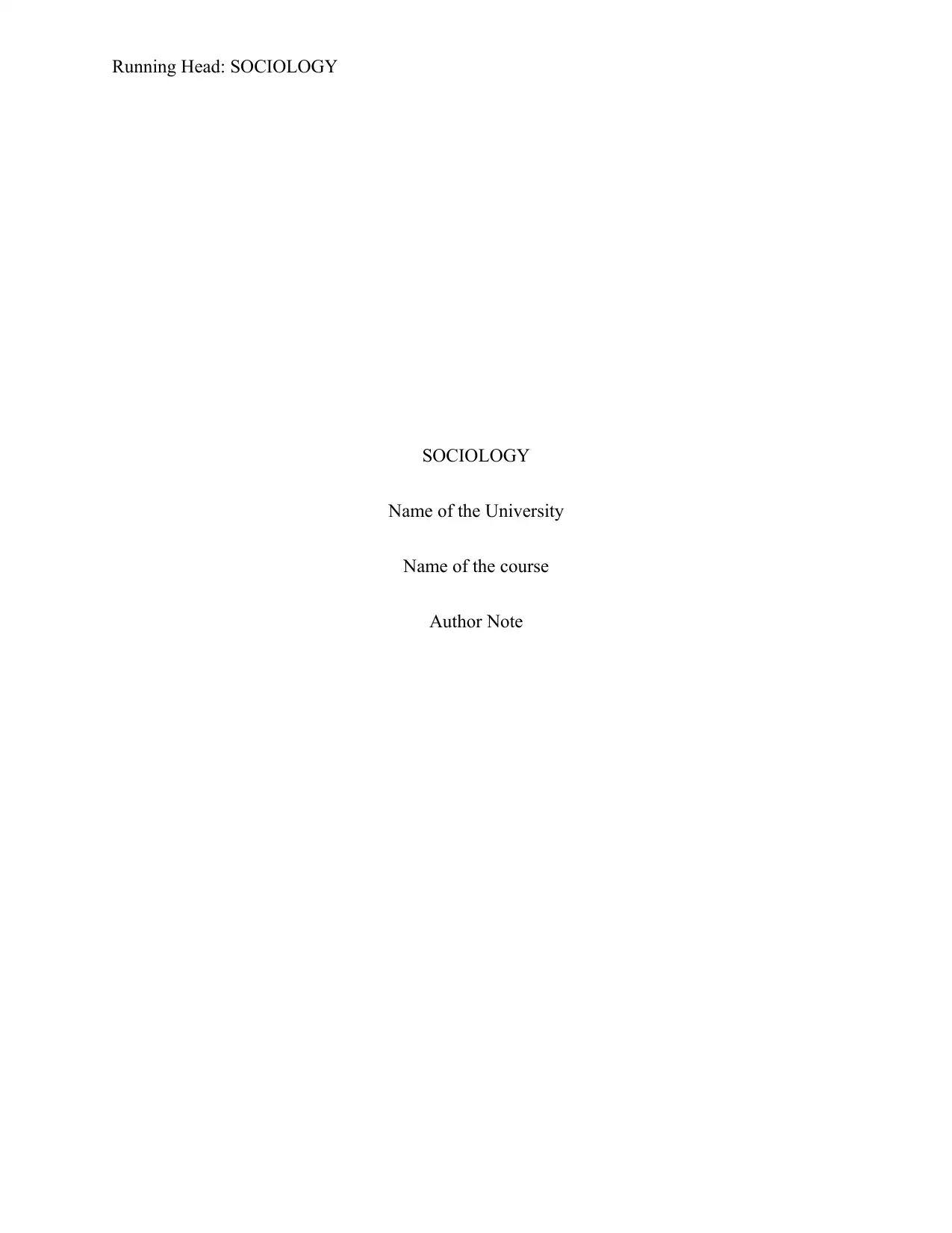
Running Head: SOCIOLOGY
SOCIOLOGY
Name of the University
Name of the course
Author Note
SOCIOLOGY
Name of the University
Name of the course
Author Note
Paraphrase This Document
Need a fresh take? Get an instant paraphrase of this document with our AI Paraphraser
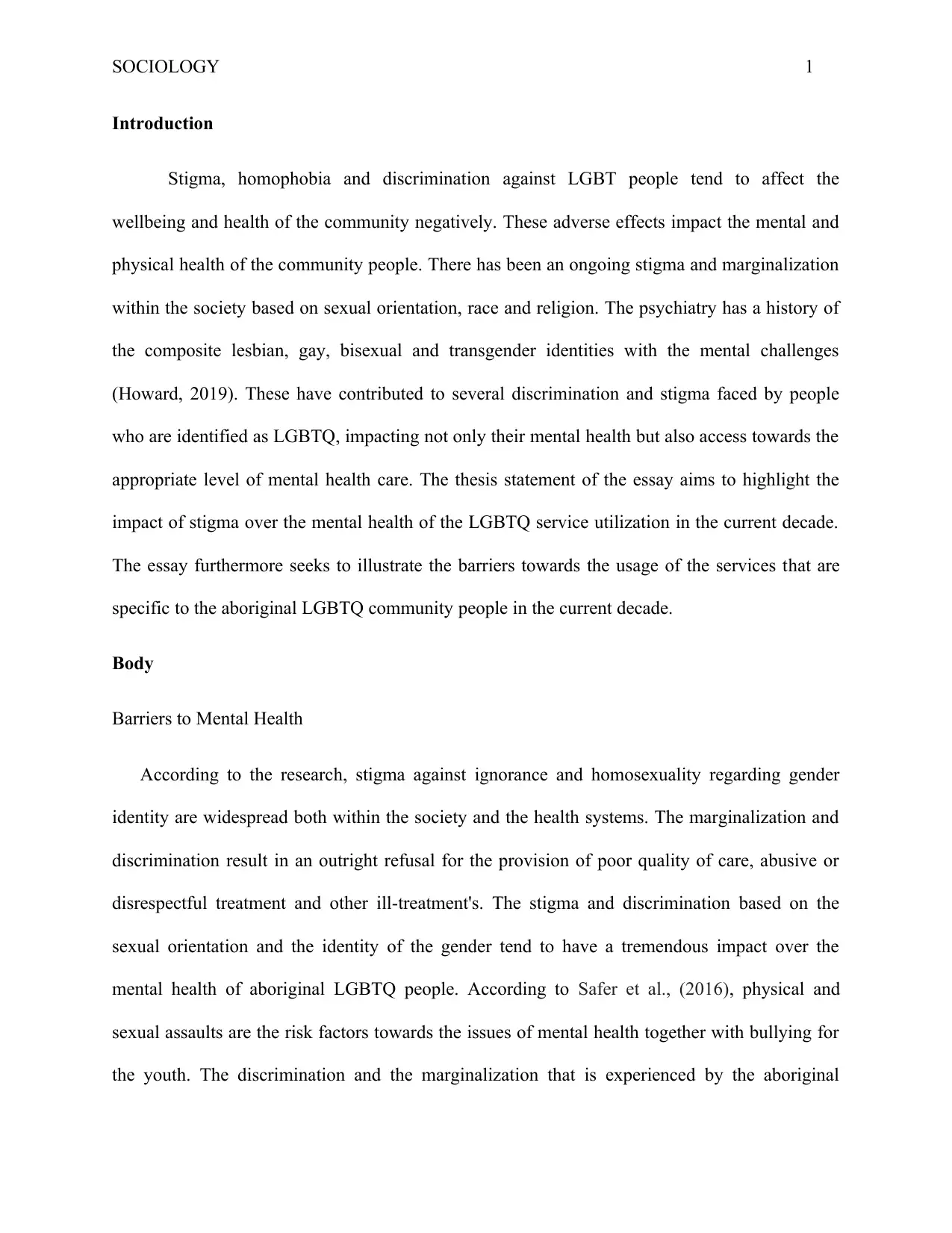
SOCIOLOGY 1
Introduction
Stigma, homophobia and discrimination against LGBT people tend to affect the
wellbeing and health of the community negatively. These adverse effects impact the mental and
physical health of the community people. There has been an ongoing stigma and marginalization
within the society based on sexual orientation, race and religion. The psychiatry has a history of
the composite lesbian, gay, bisexual and transgender identities with the mental challenges
(Howard, 2019). These have contributed to several discrimination and stigma faced by people
who are identified as LGBTQ, impacting not only their mental health but also access towards the
appropriate level of mental health care. The thesis statement of the essay aims to highlight the
impact of stigma over the mental health of the LGBTQ service utilization in the current decade.
The essay furthermore seeks to illustrate the barriers towards the usage of the services that are
specific to the aboriginal LGBTQ community people in the current decade.
Body
Barriers to Mental Health
According to the research, stigma against ignorance and homosexuality regarding gender
identity are widespread both within the society and the health systems. The marginalization and
discrimination result in an outright refusal for the provision of poor quality of care, abusive or
disrespectful treatment and other ill-treatment's. The stigma and discrimination based on the
sexual orientation and the identity of the gender tend to have a tremendous impact over the
mental health of aboriginal LGBTQ people. According to Safer et al., (2016), physical and
sexual assaults are the risk factors towards the issues of mental health together with bullying for
the youth. The discrimination and the marginalization that is experienced by the aboriginal
Introduction
Stigma, homophobia and discrimination against LGBT people tend to affect the
wellbeing and health of the community negatively. These adverse effects impact the mental and
physical health of the community people. There has been an ongoing stigma and marginalization
within the society based on sexual orientation, race and religion. The psychiatry has a history of
the composite lesbian, gay, bisexual and transgender identities with the mental challenges
(Howard, 2019). These have contributed to several discrimination and stigma faced by people
who are identified as LGBTQ, impacting not only their mental health but also access towards the
appropriate level of mental health care. The thesis statement of the essay aims to highlight the
impact of stigma over the mental health of the LGBTQ service utilization in the current decade.
The essay furthermore seeks to illustrate the barriers towards the usage of the services that are
specific to the aboriginal LGBTQ community people in the current decade.
Body
Barriers to Mental Health
According to the research, stigma against ignorance and homosexuality regarding gender
identity are widespread both within the society and the health systems. The marginalization and
discrimination result in an outright refusal for the provision of poor quality of care, abusive or
disrespectful treatment and other ill-treatment's. The stigma and discrimination based on the
sexual orientation and the identity of the gender tend to have a tremendous impact over the
mental health of aboriginal LGBTQ people. According to Safer et al., (2016), physical and
sexual assaults are the risk factors towards the issues of mental health together with bullying for
the youth. The discrimination and the marginalization that is experienced by the aboriginal
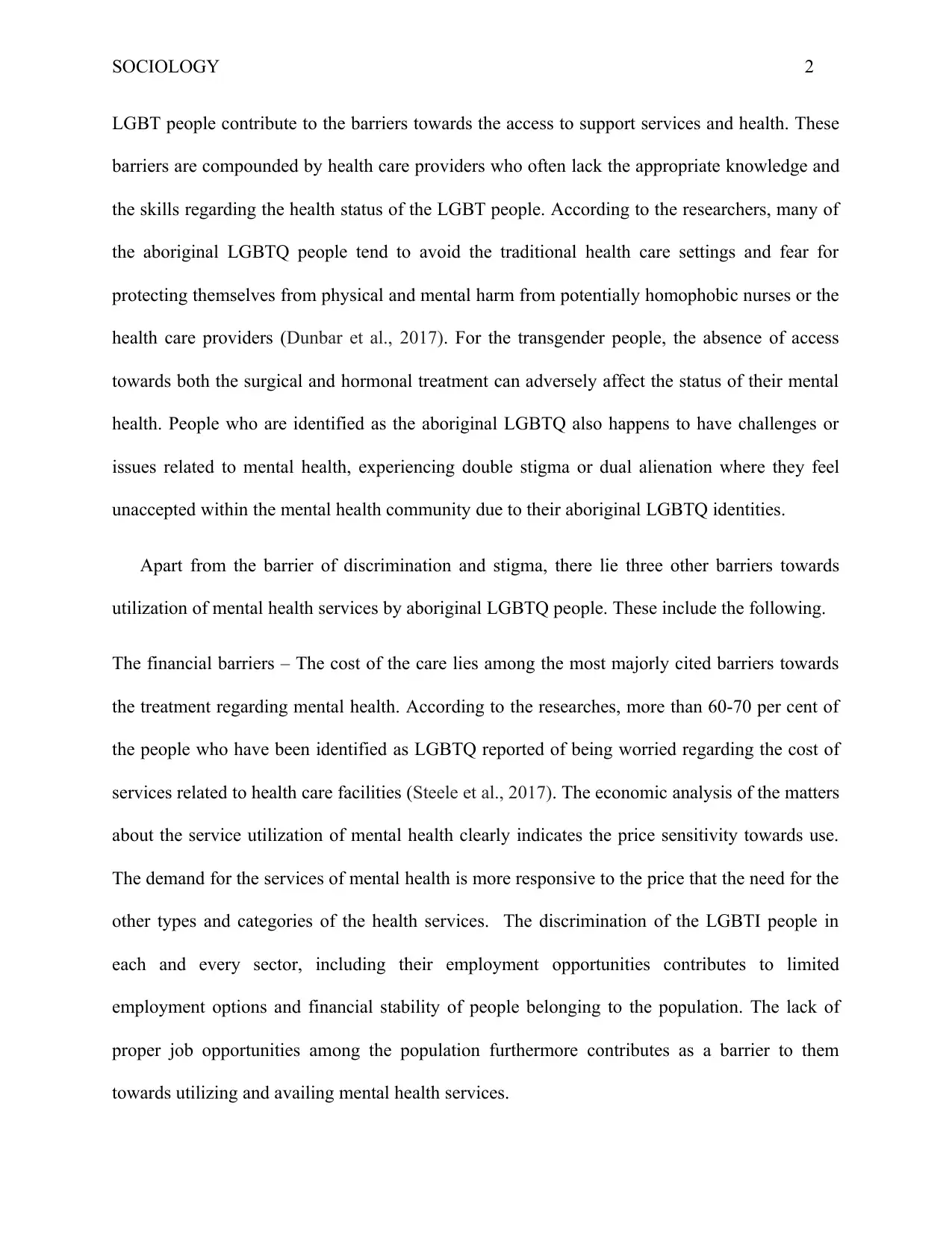
SOCIOLOGY 2
LGBT people contribute to the barriers towards the access to support services and health. These
barriers are compounded by health care providers who often lack the appropriate knowledge and
the skills regarding the health status of the LGBT people. According to the researchers, many of
the aboriginal LGBTQ people tend to avoid the traditional health care settings and fear for
protecting themselves from physical and mental harm from potentially homophobic nurses or the
health care providers (Dunbar et al., 2017). For the transgender people, the absence of access
towards both the surgical and hormonal treatment can adversely affect the status of their mental
health. People who are identified as the aboriginal LGBTQ also happens to have challenges or
issues related to mental health, experiencing double stigma or dual alienation where they feel
unaccepted within the mental health community due to their aboriginal LGBTQ identities.
Apart from the barrier of discrimination and stigma, there lie three other barriers towards
utilization of mental health services by aboriginal LGBTQ people. These include the following.
The financial barriers – The cost of the care lies among the most majorly cited barriers towards
the treatment regarding mental health. According to the researches, more than 60-70 per cent of
the people who have been identified as LGBTQ reported of being worried regarding the cost of
services related to health care facilities (Steele et al., 2017). The economic analysis of the matters
about the service utilization of mental health clearly indicates the price sensitivity towards use.
The demand for the services of mental health is more responsive to the price that the need for the
other types and categories of the health services. The discrimination of the LGBTI people in
each and every sector, including their employment opportunities contributes to limited
employment options and financial stability of people belonging to the population. The lack of
proper job opportunities among the population furthermore contributes as a barrier to them
towards utilizing and availing mental health services.
LGBT people contribute to the barriers towards the access to support services and health. These
barriers are compounded by health care providers who often lack the appropriate knowledge and
the skills regarding the health status of the LGBT people. According to the researchers, many of
the aboriginal LGBTQ people tend to avoid the traditional health care settings and fear for
protecting themselves from physical and mental harm from potentially homophobic nurses or the
health care providers (Dunbar et al., 2017). For the transgender people, the absence of access
towards both the surgical and hormonal treatment can adversely affect the status of their mental
health. People who are identified as the aboriginal LGBTQ also happens to have challenges or
issues related to mental health, experiencing double stigma or dual alienation where they feel
unaccepted within the mental health community due to their aboriginal LGBTQ identities.
Apart from the barrier of discrimination and stigma, there lie three other barriers towards
utilization of mental health services by aboriginal LGBTQ people. These include the following.
The financial barriers – The cost of the care lies among the most majorly cited barriers towards
the treatment regarding mental health. According to the researches, more than 60-70 per cent of
the people who have been identified as LGBTQ reported of being worried regarding the cost of
services related to health care facilities (Steele et al., 2017). The economic analysis of the matters
about the service utilization of mental health clearly indicates the price sensitivity towards use.
The demand for the services of mental health is more responsive to the price that the need for the
other types and categories of the health services. The discrimination of the LGBTI people in
each and every sector, including their employment opportunities contributes to limited
employment options and financial stability of people belonging to the population. The lack of
proper job opportunities among the population furthermore contributes as a barrier to them
towards utilizing and availing mental health services.
⊘ This is a preview!⊘
Do you want full access?
Subscribe today to unlock all pages.

Trusted by 1+ million students worldwide
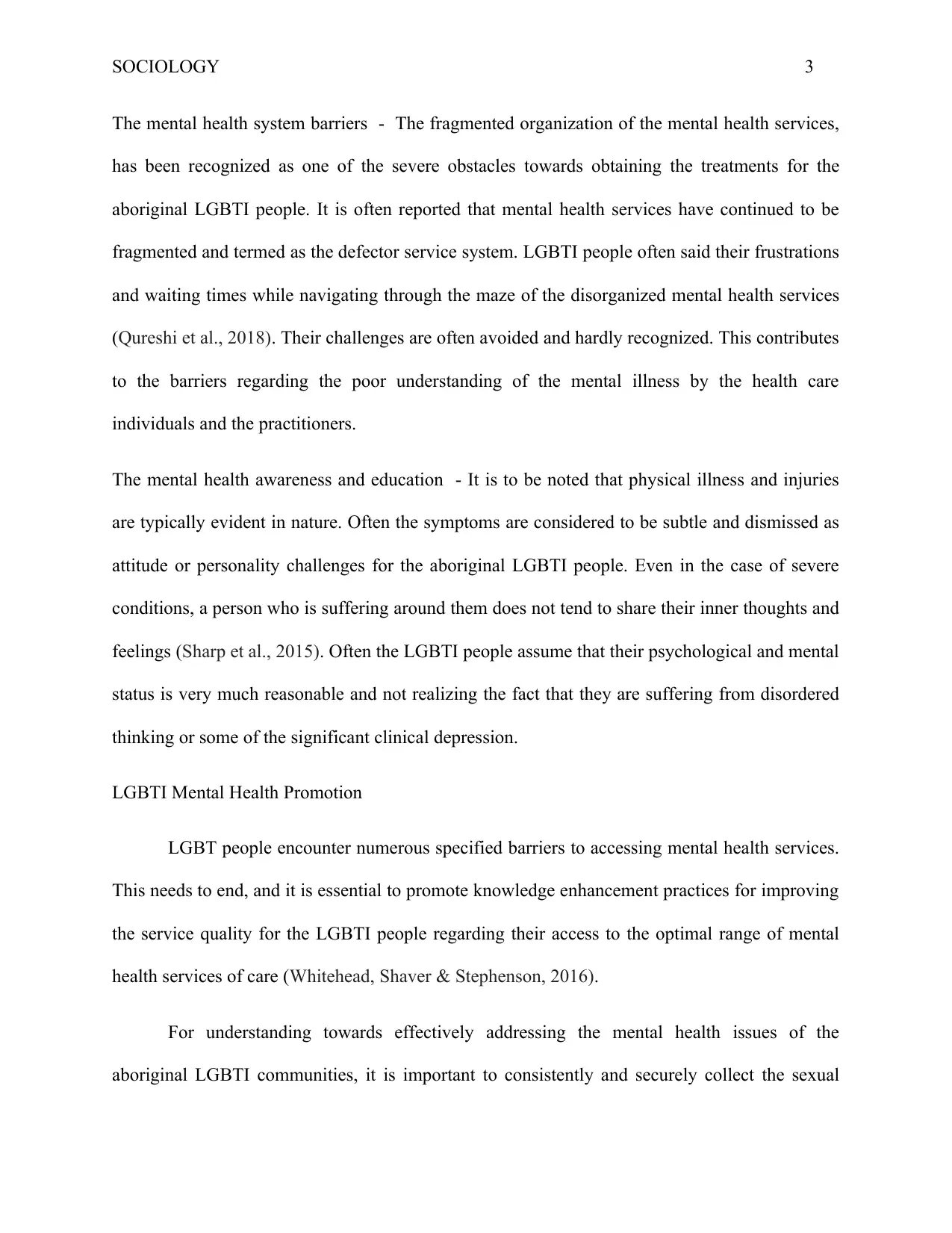
SOCIOLOGY 3
The mental health system barriers - The fragmented organization of the mental health services,
has been recognized as one of the severe obstacles towards obtaining the treatments for the
aboriginal LGBTI people. It is often reported that mental health services have continued to be
fragmented and termed as the defector service system. LGBTI people often said their frustrations
and waiting times while navigating through the maze of the disorganized mental health services
(Qureshi et al., 2018). Their challenges are often avoided and hardly recognized. This contributes
to the barriers regarding the poor understanding of the mental illness by the health care
individuals and the practitioners.
The mental health awareness and education - It is to be noted that physical illness and injuries
are typically evident in nature. Often the symptoms are considered to be subtle and dismissed as
attitude or personality challenges for the aboriginal LGBTI people. Even in the case of severe
conditions, a person who is suffering around them does not tend to share their inner thoughts and
feelings (Sharp et al., 2015). Often the LGBTI people assume that their psychological and mental
status is very much reasonable and not realizing the fact that they are suffering from disordered
thinking or some of the significant clinical depression.
LGBTI Mental Health Promotion
LGBT people encounter numerous specified barriers to accessing mental health services.
This needs to end, and it is essential to promote knowledge enhancement practices for improving
the service quality for the LGBTI people regarding their access to the optimal range of mental
health services of care (Whitehead, Shaver & Stephenson, 2016).
For understanding towards effectively addressing the mental health issues of the
aboriginal LGBTI communities, it is important to consistently and securely collect the sexual
The mental health system barriers - The fragmented organization of the mental health services,
has been recognized as one of the severe obstacles towards obtaining the treatments for the
aboriginal LGBTI people. It is often reported that mental health services have continued to be
fragmented and termed as the defector service system. LGBTI people often said their frustrations
and waiting times while navigating through the maze of the disorganized mental health services
(Qureshi et al., 2018). Their challenges are often avoided and hardly recognized. This contributes
to the barriers regarding the poor understanding of the mental illness by the health care
individuals and the practitioners.
The mental health awareness and education - It is to be noted that physical illness and injuries
are typically evident in nature. Often the symptoms are considered to be subtle and dismissed as
attitude or personality challenges for the aboriginal LGBTI people. Even in the case of severe
conditions, a person who is suffering around them does not tend to share their inner thoughts and
feelings (Sharp et al., 2015). Often the LGBTI people assume that their psychological and mental
status is very much reasonable and not realizing the fact that they are suffering from disordered
thinking or some of the significant clinical depression.
LGBTI Mental Health Promotion
LGBT people encounter numerous specified barriers to accessing mental health services.
This needs to end, and it is essential to promote knowledge enhancement practices for improving
the service quality for the LGBTI people regarding their access to the optimal range of mental
health services of care (Whitehead, Shaver & Stephenson, 2016).
For understanding towards effectively addressing the mental health issues of the
aboriginal LGBTI communities, it is important to consistently and securely collect the sexual
Paraphrase This Document
Need a fresh take? Get an instant paraphrase of this document with our AI Paraphraser
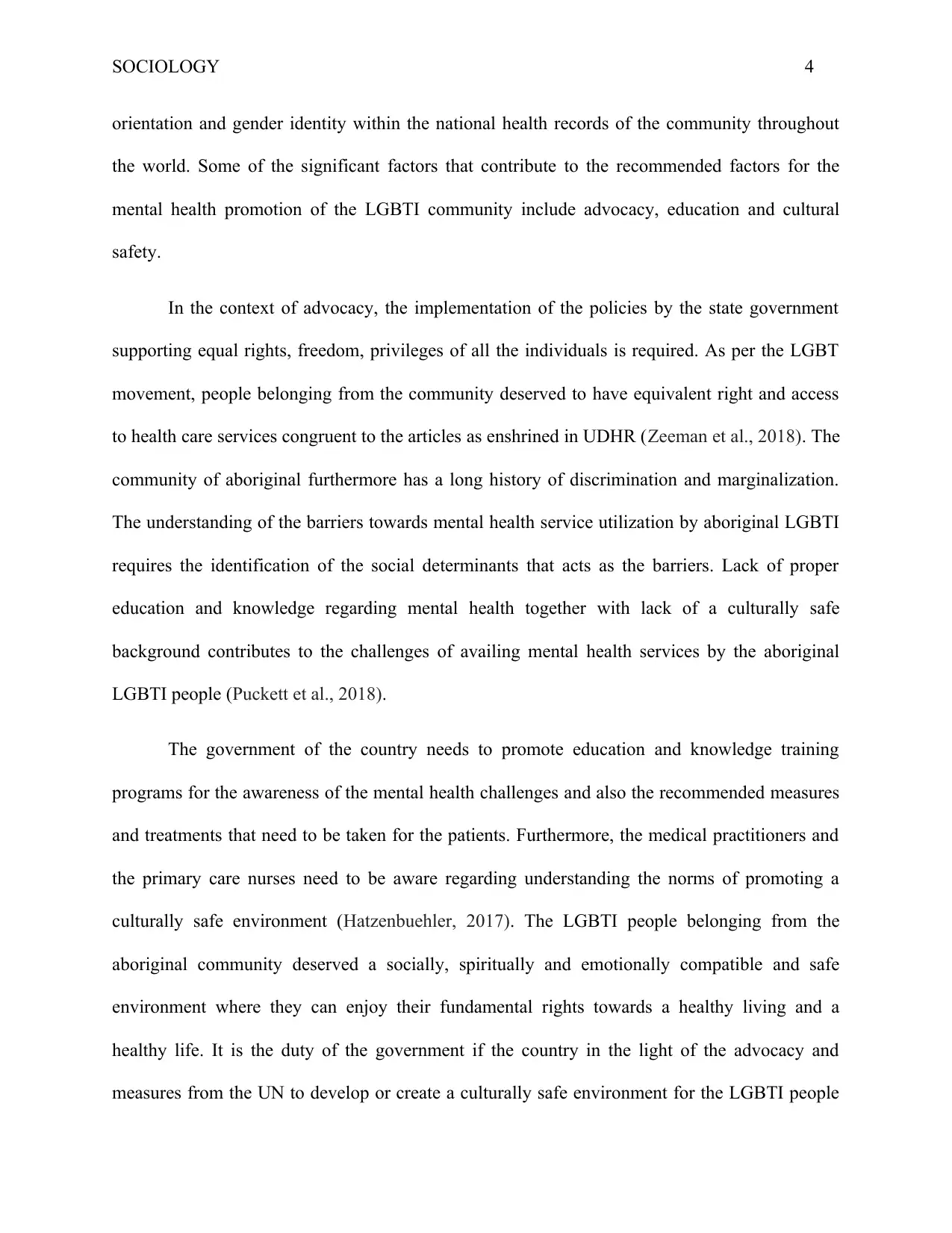
SOCIOLOGY 4
orientation and gender identity within the national health records of the community throughout
the world. Some of the significant factors that contribute to the recommended factors for the
mental health promotion of the LGBTI community include advocacy, education and cultural
safety.
In the context of advocacy, the implementation of the policies by the state government
supporting equal rights, freedom, privileges of all the individuals is required. As per the LGBT
movement, people belonging from the community deserved to have equivalent right and access
to health care services congruent to the articles as enshrined in UDHR (Zeeman et al., 2018). The
community of aboriginal furthermore has a long history of discrimination and marginalization.
The understanding of the barriers towards mental health service utilization by aboriginal LGBTI
requires the identification of the social determinants that acts as the barriers. Lack of proper
education and knowledge regarding mental health together with lack of a culturally safe
background contributes to the challenges of availing mental health services by the aboriginal
LGBTI people (Puckett et al., 2018).
The government of the country needs to promote education and knowledge training
programs for the awareness of the mental health challenges and also the recommended measures
and treatments that need to be taken for the patients. Furthermore, the medical practitioners and
the primary care nurses need to be aware regarding understanding the norms of promoting a
culturally safe environment (Hatzenbuehler, 2017). The LGBTI people belonging from the
aboriginal community deserved a socially, spiritually and emotionally compatible and safe
environment where they can enjoy their fundamental rights towards a healthy living and a
healthy life. It is the duty of the government if the country in the light of the advocacy and
measures from the UN to develop or create a culturally safe environment for the LGBTI people
orientation and gender identity within the national health records of the community throughout
the world. Some of the significant factors that contribute to the recommended factors for the
mental health promotion of the LGBTI community include advocacy, education and cultural
safety.
In the context of advocacy, the implementation of the policies by the state government
supporting equal rights, freedom, privileges of all the individuals is required. As per the LGBT
movement, people belonging from the community deserved to have equivalent right and access
to health care services congruent to the articles as enshrined in UDHR (Zeeman et al., 2018). The
community of aboriginal furthermore has a long history of discrimination and marginalization.
The understanding of the barriers towards mental health service utilization by aboriginal LGBTI
requires the identification of the social determinants that acts as the barriers. Lack of proper
education and knowledge regarding mental health together with lack of a culturally safe
background contributes to the challenges of availing mental health services by the aboriginal
LGBTI people (Puckett et al., 2018).
The government of the country needs to promote education and knowledge training
programs for the awareness of the mental health challenges and also the recommended measures
and treatments that need to be taken for the patients. Furthermore, the medical practitioners and
the primary care nurses need to be aware regarding understanding the norms of promoting a
culturally safe environment (Hatzenbuehler, 2017). The LGBTI people belonging from the
aboriginal community deserved a socially, spiritually and emotionally compatible and safe
environment where they can enjoy their fundamental rights towards a healthy living and a
healthy life. It is the duty of the government if the country in the light of the advocacy and
measures from the UN to develop or create a culturally safe environment for the LGBTI people
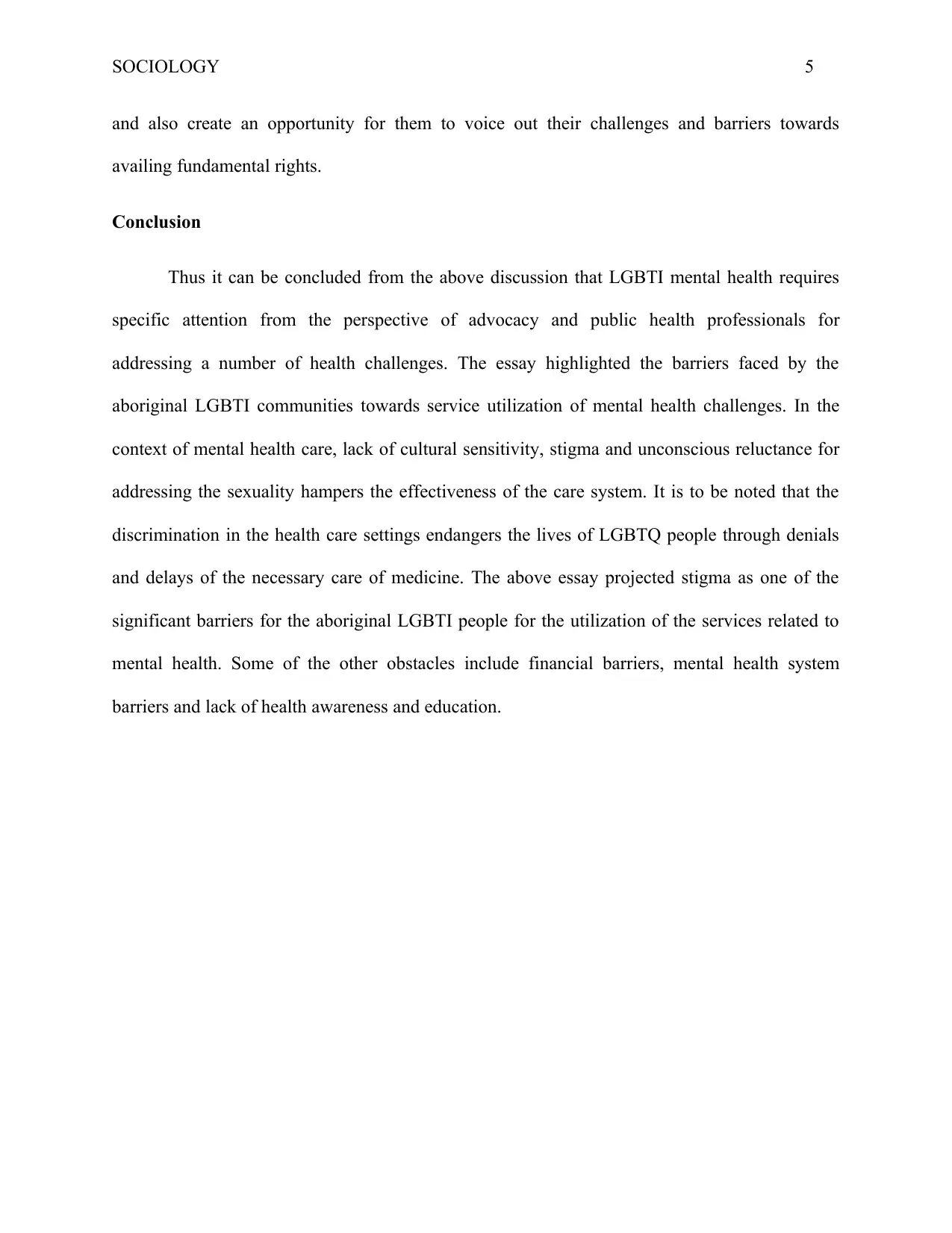
SOCIOLOGY 5
and also create an opportunity for them to voice out their challenges and barriers towards
availing fundamental rights.
Conclusion
Thus it can be concluded from the above discussion that LGBTI mental health requires
specific attention from the perspective of advocacy and public health professionals for
addressing a number of health challenges. The essay highlighted the barriers faced by the
aboriginal LGBTI communities towards service utilization of mental health challenges. In the
context of mental health care, lack of cultural sensitivity, stigma and unconscious reluctance for
addressing the sexuality hampers the effectiveness of the care system. It is to be noted that the
discrimination in the health care settings endangers the lives of LGBTQ people through denials
and delays of the necessary care of medicine. The above essay projected stigma as one of the
significant barriers for the aboriginal LGBTI people for the utilization of the services related to
mental health. Some of the other obstacles include financial barriers, mental health system
barriers and lack of health awareness and education.
and also create an opportunity for them to voice out their challenges and barriers towards
availing fundamental rights.
Conclusion
Thus it can be concluded from the above discussion that LGBTI mental health requires
specific attention from the perspective of advocacy and public health professionals for
addressing a number of health challenges. The essay highlighted the barriers faced by the
aboriginal LGBTI communities towards service utilization of mental health challenges. In the
context of mental health care, lack of cultural sensitivity, stigma and unconscious reluctance for
addressing the sexuality hampers the effectiveness of the care system. It is to be noted that the
discrimination in the health care settings endangers the lives of LGBTQ people through denials
and delays of the necessary care of medicine. The above essay projected stigma as one of the
significant barriers for the aboriginal LGBTI people for the utilization of the services related to
mental health. Some of the other obstacles include financial barriers, mental health system
barriers and lack of health awareness and education.
⊘ This is a preview!⊘
Do you want full access?
Subscribe today to unlock all pages.

Trusted by 1+ million students worldwide
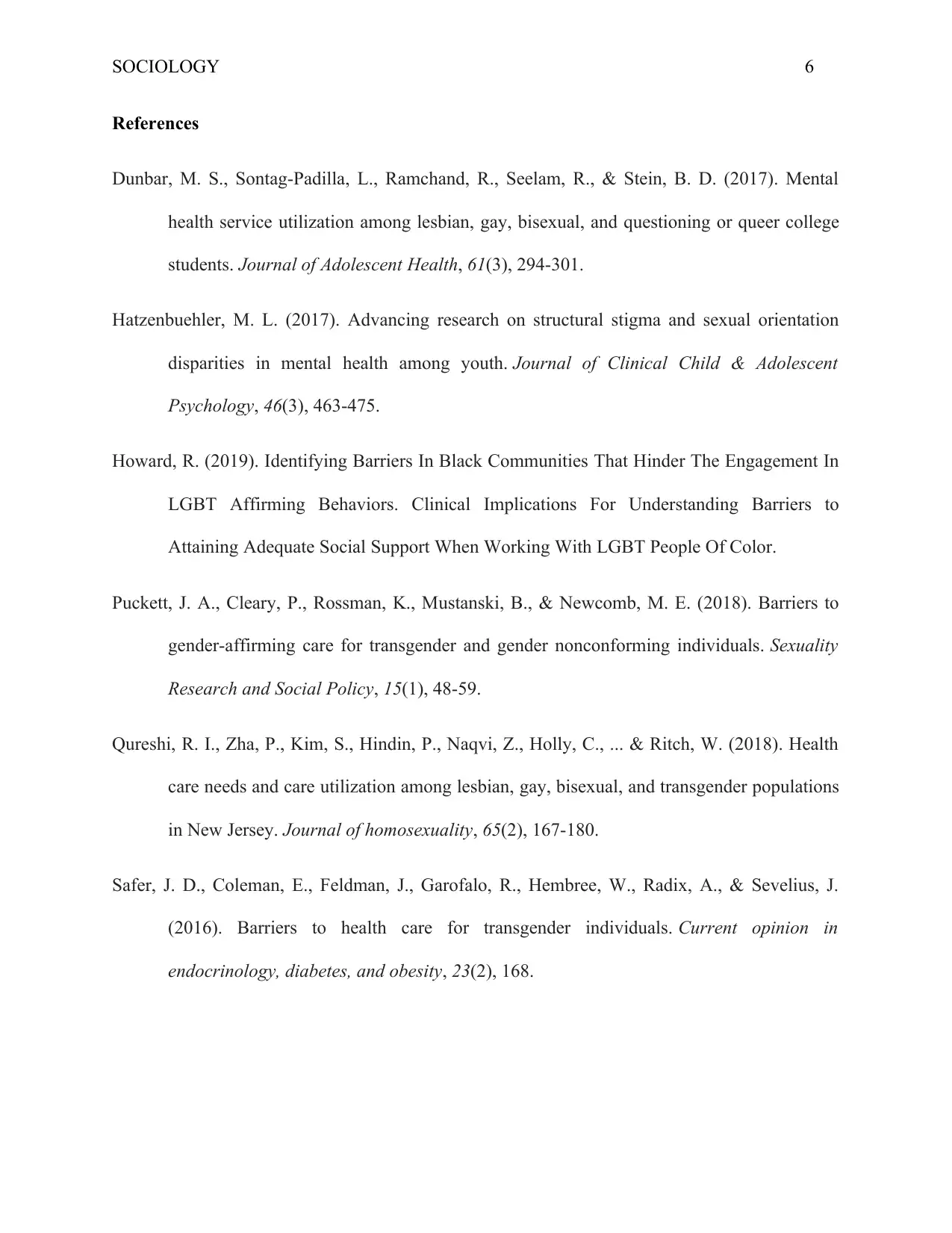
SOCIOLOGY 6
References
Dunbar, M. S., Sontag-Padilla, L., Ramchand, R., Seelam, R., & Stein, B. D. (2017). Mental
health service utilization among lesbian, gay, bisexual, and questioning or queer college
students. Journal of Adolescent Health, 61(3), 294-301.
Hatzenbuehler, M. L. (2017). Advancing research on structural stigma and sexual orientation
disparities in mental health among youth. Journal of Clinical Child & Adolescent
Psychology, 46(3), 463-475.
Howard, R. (2019). Identifying Barriers In Black Communities That Hinder The Engagement In
LGBT Affirming Behaviors. Clinical Implications For Understanding Barriers to
Attaining Adequate Social Support When Working With LGBT People Of Color.
Puckett, J. A., Cleary, P., Rossman, K., Mustanski, B., & Newcomb, M. E. (2018). Barriers to
gender-affirming care for transgender and gender nonconforming individuals. Sexuality
Research and Social Policy, 15(1), 48-59.
Qureshi, R. I., Zha, P., Kim, S., Hindin, P., Naqvi, Z., Holly, C., ... & Ritch, W. (2018). Health
care needs and care utilization among lesbian, gay, bisexual, and transgender populations
in New Jersey. Journal of homosexuality, 65(2), 167-180.
Safer, J. D., Coleman, E., Feldman, J., Garofalo, R., Hembree, W., Radix, A., & Sevelius, J.
(2016). Barriers to health care for transgender individuals. Current opinion in
endocrinology, diabetes, and obesity, 23(2), 168.
References
Dunbar, M. S., Sontag-Padilla, L., Ramchand, R., Seelam, R., & Stein, B. D. (2017). Mental
health service utilization among lesbian, gay, bisexual, and questioning or queer college
students. Journal of Adolescent Health, 61(3), 294-301.
Hatzenbuehler, M. L. (2017). Advancing research on structural stigma and sexual orientation
disparities in mental health among youth. Journal of Clinical Child & Adolescent
Psychology, 46(3), 463-475.
Howard, R. (2019). Identifying Barriers In Black Communities That Hinder The Engagement In
LGBT Affirming Behaviors. Clinical Implications For Understanding Barriers to
Attaining Adequate Social Support When Working With LGBT People Of Color.
Puckett, J. A., Cleary, P., Rossman, K., Mustanski, B., & Newcomb, M. E. (2018). Barriers to
gender-affirming care for transgender and gender nonconforming individuals. Sexuality
Research and Social Policy, 15(1), 48-59.
Qureshi, R. I., Zha, P., Kim, S., Hindin, P., Naqvi, Z., Holly, C., ... & Ritch, W. (2018). Health
care needs and care utilization among lesbian, gay, bisexual, and transgender populations
in New Jersey. Journal of homosexuality, 65(2), 167-180.
Safer, J. D., Coleman, E., Feldman, J., Garofalo, R., Hembree, W., Radix, A., & Sevelius, J.
(2016). Barriers to health care for transgender individuals. Current opinion in
endocrinology, diabetes, and obesity, 23(2), 168.
Paraphrase This Document
Need a fresh take? Get an instant paraphrase of this document with our AI Paraphraser
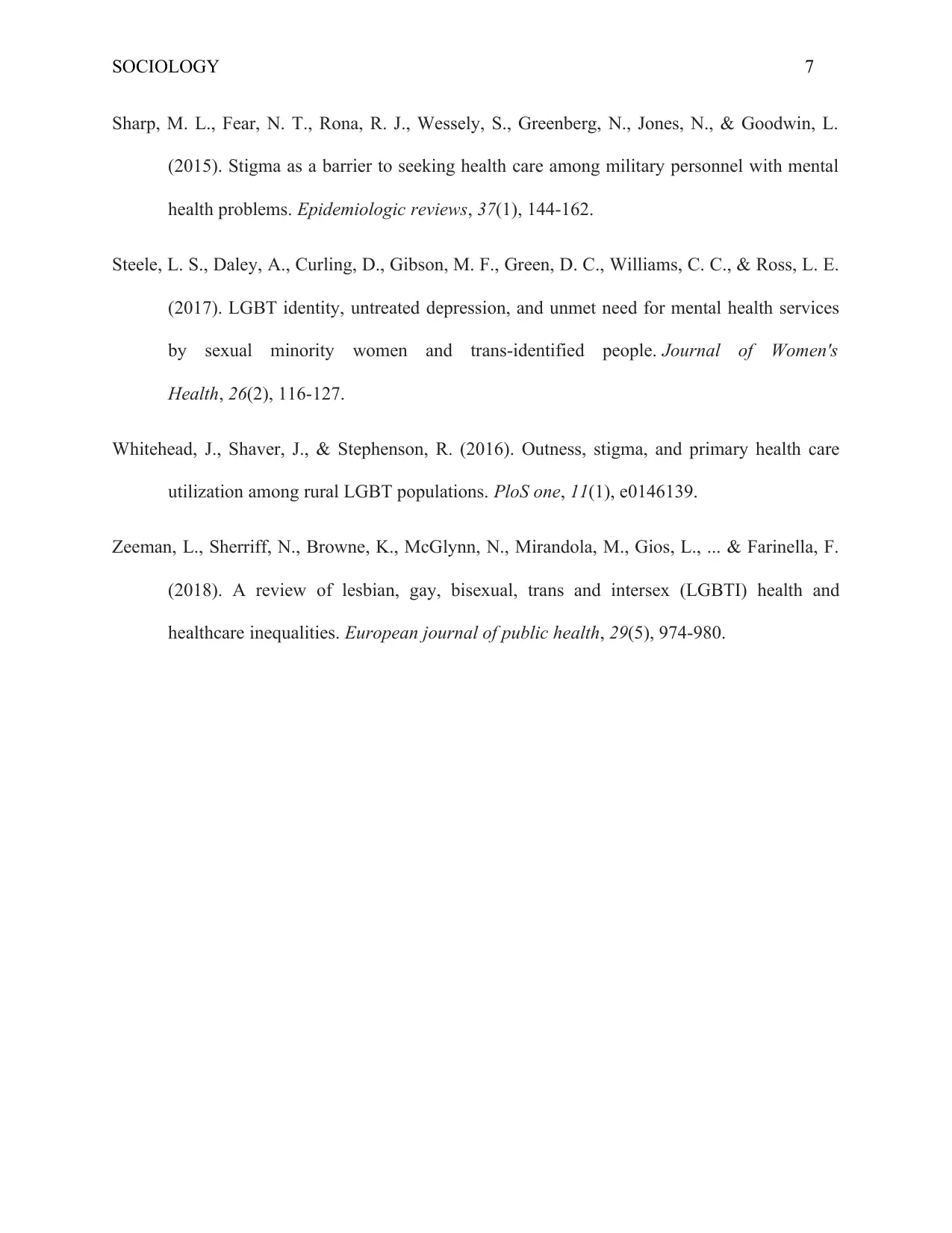
SOCIOLOGY 7
Sharp, M. L., Fear, N. T., Rona, R. J., Wessely, S., Greenberg, N., Jones, N., & Goodwin, L.
(2015). Stigma as a barrier to seeking health care among military personnel with mental
health problems. Epidemiologic reviews, 37(1), 144-162.
Steele, L. S., Daley, A., Curling, D., Gibson, M. F., Green, D. C., Williams, C. C., & Ross, L. E.
(2017). LGBT identity, untreated depression, and unmet need for mental health services
by sexual minority women and trans-identified people. Journal of Women's
Health, 26(2), 116-127.
Whitehead, J., Shaver, J., & Stephenson, R. (2016). Outness, stigma, and primary health care
utilization among rural LGBT populations. PloS one, 11(1), e0146139.
Zeeman, L., Sherriff, N., Browne, K., McGlynn, N., Mirandola, M., Gios, L., ... & Farinella, F.
(2018). A review of lesbian, gay, bisexual, trans and intersex (LGBTI) health and
healthcare inequalities. European journal of public health, 29(5), 974-980.
Sharp, M. L., Fear, N. T., Rona, R. J., Wessely, S., Greenberg, N., Jones, N., & Goodwin, L.
(2015). Stigma as a barrier to seeking health care among military personnel with mental
health problems. Epidemiologic reviews, 37(1), 144-162.
Steele, L. S., Daley, A., Curling, D., Gibson, M. F., Green, D. C., Williams, C. C., & Ross, L. E.
(2017). LGBT identity, untreated depression, and unmet need for mental health services
by sexual minority women and trans-identified people. Journal of Women's
Health, 26(2), 116-127.
Whitehead, J., Shaver, J., & Stephenson, R. (2016). Outness, stigma, and primary health care
utilization among rural LGBT populations. PloS one, 11(1), e0146139.
Zeeman, L., Sherriff, N., Browne, K., McGlynn, N., Mirandola, M., Gios, L., ... & Farinella, F.
(2018). A review of lesbian, gay, bisexual, trans and intersex (LGBTI) health and
healthcare inequalities. European journal of public health, 29(5), 974-980.
1 out of 8
Related Documents
Your All-in-One AI-Powered Toolkit for Academic Success.
+13062052269
info@desklib.com
Available 24*7 on WhatsApp / Email
![[object Object]](/_next/static/media/star-bottom.7253800d.svg)
Unlock your academic potential
Copyright © 2020–2026 A2Z Services. All Rights Reserved. Developed and managed by ZUCOL.





